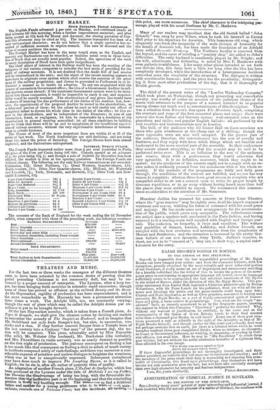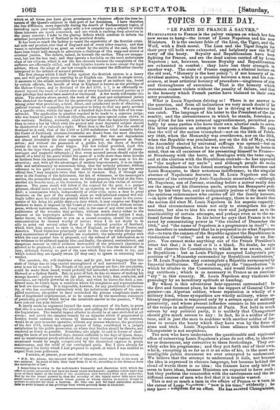ADMINISTRATION OF CRIMINAL JUSTICE IN SCOTLAND.
TO THE EDITOR OF THE SPECTATOR.,
1.4uiDariiig many: years' ,peresal of :your' inetntctin -audiefluential journal, I haVeiebeetivd, with the natural *tide of eviniteof Scotland, the readmess with which at an times yea have given prominence to whatever affect& the-trua in- tereetr-ef 4. Queen's subjects in that part of her dominions. I have therefore the less diffidence, more especially during the dearth of Parliamentary topics, of intruding upon your valuable space with a few remarks upon a subject in which these interests are much concerned, and one which is exciting deep attention in the sister country: I refer to the glaring defects which continue to deform the criminal jurisprudence of Scotland in its practical details. It has been so much the fashion to vaunt the superiority of the Scottish crimi- nal code and practice over that of England and of every other country, and that vaunt is substantiated to so great an extent by the merits of the case, that few have been found bold enough to adventure a challenge of this supposed mirror of criminal justice. The defects, indeed, lie beneath the surface. They are unappa- rent, but not the less real; and they operate a hardship on the most unfortunate class of our citizens, which is not the less clamant because the complaints of the sufferers are effectually stifled, and their injuriee known to none except the legal adviser, whom the usage of our law compels to encounter the difficulties thereby interposed to the defence of accused persons. The first charge which I shall bring against the Scottish system is a heavy one, and will probably prove startling to an English ear. Stated in simple terms, it amounts to the almost incredible fact that, by means of an indirect tax, levied by certain officials, the benefit of what in England is known as the privilege of the Habeas Corpus, and in Scotland of the Act 1701, c. 7, is as effectually re- moved beyond the reach of ninety-nine out of every hundred accused parties as if that privilege had never been asserted or vindicated. A few words will render this plain. The statute above quoted, the work of the great and enlightened jurists who sketched the frame of law for the protection of the subject's liberty, enacted, among other wise provisions, a brief, direct, and satisfactory mode of obtaining a judicial warrant for compelling the prosecutor to bring to trial any party accused of a specific crime, within the space of a hundred days from the date of his com- mitment. The application in question required to be made to a supreme judge; who was bound to grant it without objection, unless upon special cause shown to the contrary. Nothing, evidently, could be farther from the legislative intention than to raise a bar by which even the poorest and most degraded subject should be disinherited of so valuable a right. What then is the fact? For the credit of Scotland be it said, that of the 1,100 or 1,200 malefactors tried annually before the Court of Justiciary, nineteen-twentieths are drawn from the most dissolute, depraved, and degraded class of the community. But vice and degradation are almost invariably the close cognates of a poverty as desperate as them- selves; and without the possession of a golden key, the doors of Scottish justice do not move on their hinges. The law indeed provided, (and this even in the days when pedlars and pack-horses served in the stead of steam- carriages and magnetic telegraphs,) that every accused person should enjoy the benefit of a trial by his peers within the space of a trifle more than three months at farthest from his incarceration. But the poverty of the poor man is his de- struction; and, with all the advantages of modern improvements, it is no impos- sible and unfortunately no uncommon thing, that the unlucky prisoner, without reference to his guilt or innocence, but merely to his inability to pay the usual official fees,• may languish twice that time in durance. Nay, if through any error in the framing of the indictment, the list of witnesses, or the messenger's service, the prosecutor should see cause to forbear pressing the trial at the time, another six months may, at his discretion, be inflicted on this victim of circum- stances. The same result will follow if the counsel for the poor, i, e. pauper prisoner, should insist and be successful in an objection to the relevancy of the libel; a consequence which, independently of other evils, opens a door to great looseness on the part of the accused, since no well-informed counsel will wil- lingly inflict upon his client the penalty which he well knows must be the conse- quence of his doing his public duty,—a duty which, it may surprise our English brethren to learn, is imposed by the Court at the moment of trial, without recom- pense, without instructions, and, I may add, in the case of any error such as the suddenness of the occasion may produce, without much mercy either to the prisoner or his impromptu adviser. On this last-mentioned subject I may, under favour, be troublesome to you on a second occasion, should the present communication be deemed worthy of notice; when I do not doubt to be able to point out several other flaws in the criminal practice of Scotland, which have long ceased to exist in that of England, as well as of France and _America. These blemishes principally exist in the rules by which the prelimi- nary examinations of accused parties are conducted; the unworthy privacy with which the case against him is prepared, and the refusal of all information as to the evidence to be adduced against him- and finally, the absurd, contradictory, and dangerous manner in which evidence 'destructive of the prisoner's character is allowed to be produced, in such a manner as inevitably to bias the decision of the jury, although forming no part of the case which they are sworn to try, and which indeed they are equally sworn (if they can) to ignore in returning their verdict.
The question, Sir, will doubtless arise, and beput., how it happens that this state of things has so long existed nncomplained of and nnremedied ? The an- swer is not far to seek.f The friends of the poor prisoner are few; his complaints, could he make them heard, would probably fall unheeded, unless overheard by a Howard or a Sydney Smith. But, in point of fact, he has no means of making his -wrongs known: poverty seals his lips previous to his trial; fear, confusion, and iznoraceo, are equally powerful on his trial; and when he leaves the dock a sen- tenced man, he enters upon a condition where his complaints and representations at beat are unavailing. It is impossible, however, for any practitioner of human- ity, or who has conversed extensively with the unfortunate subjects of his com- pelled exertions, altogether to have overlooked the piteous complaints made to him of lengthened imprisonment, or to be unmoved by the monstrous statement of paralyzing poverty which forms the invariable answer to the question, " Why have you not run your letters?" It surely needs no argument beyond the mere statement of the facts, to prove that this is a case demanding the attention and calling for the reforming band of the Legislature. The hateful impost alluded to should be at once abolished at all events; and surely the simplest remedy for an injustice which if perpetrated in London would summon its citizens by thousands to clamour for its removal, would be at once to render operative, without any process whatever, the provisions of the Act 1701, unless upon special ground of delay, established to a judge's satisfaction by the public prosecutor, on whom that burden should be thrown, and rendered as heavy as possible. Something also might be said in favour of short- ening the term of one hundred days, deemed sufficient in the days of Queen Anne; and no unsubstantial proofs advanced, that any direct increase of expense thereby occasioned would be amply compensated by the diminished expense in prison maintenance, and the relief of our surcharged gaols. But I have already far overstepped the limits which I had proposed to myself, or which I was entitled to expect from your politeness. I remain, at present, your most obedient servant, INDICATOR.
* N.B. Mr. Alison, the talented Sheriff of Glasgow, states the fees in his work at two guineas. In point of fact, they vary from 11. to 41., according to the distance from- the metropolis of law.
t Something is owing to the well-known humanity and discretion with which the office of public prosecutor has been for many years discharged ; qualities which have lost none of their lustre in the hands of the gentlemen now invested with that authority. But by far the truest answer is, that the severity of the injury never fails upon that small number of accused persons whose purses or whose station in society would be certain to procure for them a hearing. Ile who can pay for legal assistance seldom fails to avail himself of the privilege from which poverty alone Is excluded.



























 Previous page
Previous page